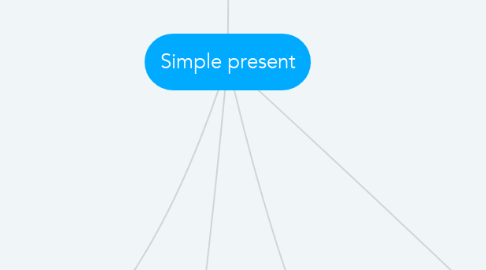Simple present
by Thais Nathalia

1. ⇒⇒ Simple present - verbo descreve ações que acontecem todo dia. I go to school. - Eu vou para a escola. They sleep late. - Eles dormem tarde. John plays soccer every day. - John joga futebol todo dia. →→ Simple Present - terceira pessoa do singular Na maioria dos verbos em inglês, no presente simples - terceira pessoa do singular (he - she - it), basta acrescentar ''s''. Mas alguns verbos seguem algumas regras. Verbos terminados em ''o, sh, ch, x ou ss'', na terceira pessoa do singular (he - she - it) acrescenta ''es'' He goes He washes She watches He fixes He misses Verbos terminados em consoante seguida de Y, remove o Y e adiciona ''ies''. I carry - She carries Verbos terminados em vogal seguida da letra Y, vamos apenas adicionar a letra S no final. I play - He plays We stay - She stays →→ Auxiliares do Simple Present - Do / Does - interrogativa / negativa Do >>> usado com I - you - we - they Does >>> usado com He - she - it (na presença do auxiliar DOES o verbo volta para a forma normal na interrogativa/negativa.) We stay home every night. Do we stay home every night? We don't stay home every night. Liz lives in Texas. Does she live in Texas? Liz doesn't live in Texas.
1.1. Simple present
2. →→ Simple Present - terceira pessoa do singular Na maioria dos verbos em inglês, no presente simples - terceira pessoa do singular (he - she - it), basta acrescentar ''s''. Mas alguns verbos seguem algumas regras. Verbos terminados em ''o, sh, ch, x ou ss'', na terceira ⇒⇒ Present continuous - descreve ações que estão acontecendo no momento em que se fala. → Estrutura present continuous - sfirmativa sujeito + verbo to be + verbo -ing + complemento I am doing my homework now. They are playing soccer now. → Estrutura present continuous - interrogativa verbo to be + sujeito + verbo -ing + complemento Are you playing soccer? → Estrutura present continuous - negativa sujeito + verbo to be + not + verbo -ing + complemento John is not running at the park.
2.1. Present continuous
3. ⇒ ⇒⇒ Simple Past - descreve ações que aconteceram no passado e não estão mais acontecendo. Sujeito + passado + complemento John went to school yesterday David bought a new car. We were at home. She was here. → Simple Past Negativa Auxiliar DID >>>> na presença do auxiliar DID o verbo volta para a forma normal na interrogativa/negativa. Sujeito + did + not + verbo + complemento John didn't go to school yesterday. David didn't buy a new car. → Simple Past Interrogativa Auxiliar DID - na presença do auxiliar DID o verbo volta para a forma normal na interrogativa/negativa. DID + sujeito + verbo + complemento Did John go to school yesterday? Did Helen study for the tests? → Simple past com verbo ''to be'' - negativa >> acrescenta ''not'' depois do verbo Sujeito + was + not + complemento She was not here. They were not at home. → Simple past com verbo ''to be'' - interrogativa >> coloca o verbo na frente do sujeito >> início da frase Was/were + sujeito + complemento Was she here? Were they at home?
3.1. Simple past
4. ⇒⇒ Past continuous - descreve ações que estavam acontecendo no passado ao mesmo tempo em que outro fato acontecia. → Estrutura do past continuous Subject + Past to be (was - were) + verbo -ing + complemento She was studying when she saw the dog. Ela estava estudando quando ela viu o cachorro. → Estrutura past continuous - interrogativa was / were + sujeito + verbo -ing + complemento Were you playing soccer? → Estrutura past continuous - negativa sujeito + was / were + not + verbo -ing + complemento John was not running at the park.
5. ⇒⇒ Simple future com ''will'' - futuro incerto - não planejado sujeito + will + verbo + complemento I will go to the park tomorrow. She will ride a bike next Sunday. → Futuro com will - interrogativa Will + sujeito + verbo + complemento Will you play soccer? Will she clean her room? → Futuro com will - negativa sujeito + will + not + verbo + complemento John will not run at the park. The kids will not play soccer tomorrow. ⇒⇒ Present perfect - Indica quando a ação começou ou quanto tempo faz que ela está ocorrendo. Sujeito + has/have + verbo particípio + complemento I have studied German since 2017. → Present Perfect - negative Sujeito + has/have + not + particípio + complemento I haven't been online since yesterday. She hasn't studied French since last year. → Present Perfect - interrogativa Has/have + sujeito +particípio + complemento Has John studied Greek? Have you gone to Alaska?
5.1. Simple future


